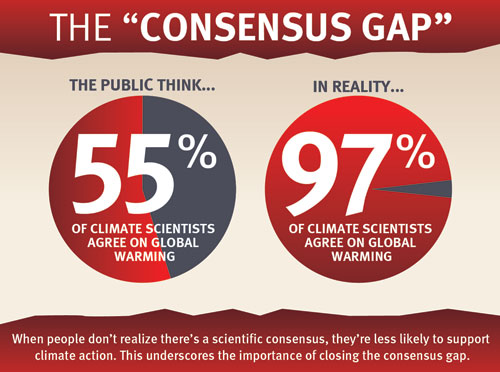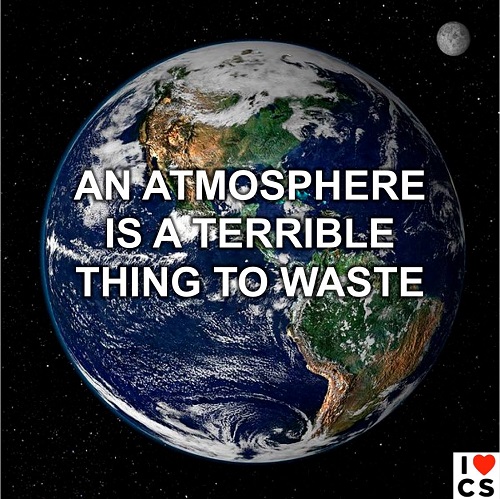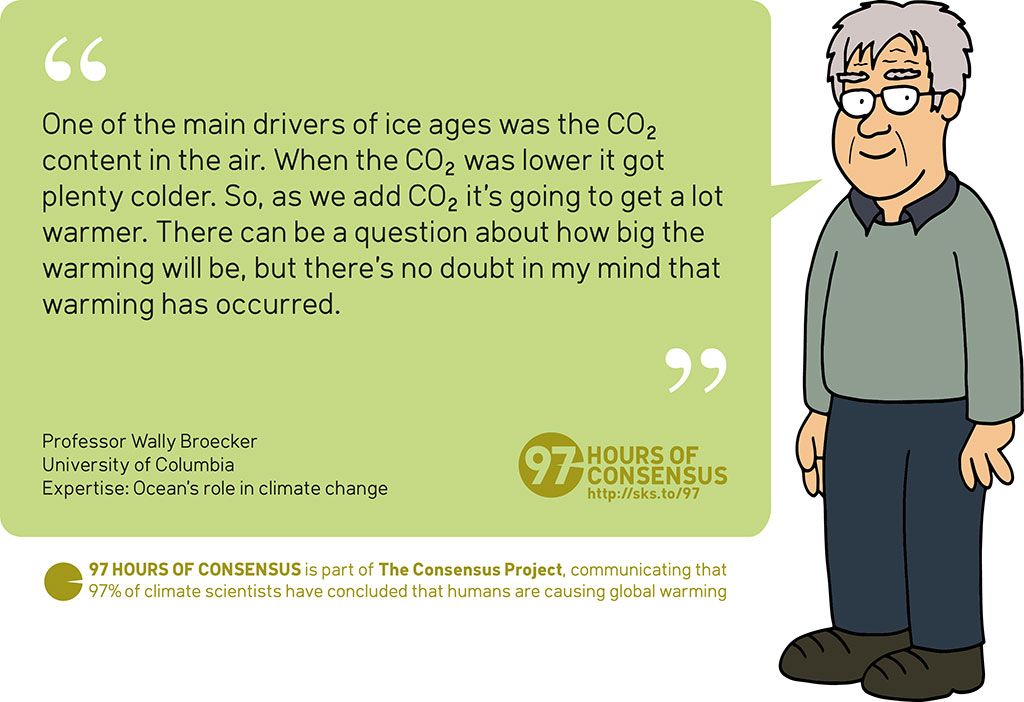2016 SkS Weekly Digest #21
Posted on 22 May 2016 by John Hartz
SkS Highlights... El Niño to La Niña... Toon of the Week... Quote of the Week... He Said What?... SkS in the News... SkS Spotlights... Coming Soon on SkS... Poster of the Week... SkS Week in Review... 97 Hours of Consensus...
SkS Highlights
Lord Krebs: scientists must challenge poor media reporting on climate change by John Krebs (The Conversation UK) attracted the highest number of comments of the articles posted on SkS during the past week. What Sir David King gets wrong about carbon pricing by Judy Hindley and Brian Utton (Climate Consensus - the 97%, Guardian) drew the second highest number of comments.
El Niño to La Niña
One of the strongest El Niños on record has been dominating the tropical Pacific Ocean for the past year. But beneath the surface, a deep pool of cool water has been sliding slowly eastward for the past couple of months. This massive, slow-motion wave is a favorable sign that La Niña—the cool phase of the ENSO climate pattern—might develop.
La Niña coming? Deep pool of cool water is making its way across tropical Pacific by Rebecca Lindsey, Climate.gov (NOAA), May 16, 2016
Toon of the Week

Quote of the Week
So Arctic amplification has long been understood — and, confirming the theory, the Arctic has already beenwarming much faster than the more temperate latitudes. Even in this context, though, scientists have been noting that there seems to be something especially stark about what’s happening atop the world this year, which has seen overall temperatures soar to new highs.
“We’re in record breaking territory no matter how you look at it,” says Jennifer Francis, an Arctic specialist at Rutgers University who has published widely on how Arctic changes affect weather in the mid-latitudes. “The ice is really low, the temperatures are really high, the fire seasons have started earlier,” she says.
It’s an “uncharted territory situation that we’re finding ourselves in,” Francis says.
Even for the fast-melting Arctic, 2016 is in ‘uncharted territory’ by Chris Mooney, Energy & Environment, Washington Post, May 16, 2016
He Said What?
Republican presidential contender Donald Trump said on Tuesday he would renegotiate America’s role in the U.N. global climate accord, spelling potential doom for an agreement many view as a last chance to turn the tide on global warming.
A pull-out by the world’s second biggest carbon-emitting country would hobble the deal reached in Paris last December by nearly 200 nations, who for the first time in more than two decades found a common vision for curbing greenhouse gas emissions.
"I will be looking at that very, very seriously, and at a minimum I will be renegotiating those agreements, at a minimum. And at a maximum I may do something else," the New York real estate mogul said in an interview with Reuters.
"But those agreements are one-sided agreements and they are bad for the United States."
Trump said he did not believe China, the world’s top emitter of the carbon dioxide gas that many scientists believe is contributing to global climate change, would adhere to its pledge under the Paris deal.
"Not a big fan because other countries don’t adhere to it, and China doesn’t adhere to it, and China’s spewing into the atmosphere," he said.
Exclusive: Skeptical Trump says would renegotiate global climate deal by Emily Flitter & Steve Holland, Reuters, May 18, 2016
SkS in the News
In his Climate Progress post, The Insidious Way The Media Downplays Climate Science, Joe Romm features the SkS Consenus Gap graphic:

John Cook's article, The things people ask about the scientific consensus on climate change, originally posted on The Conversation UK, was reposted on Science Rocks My World and Real Clear Science.
In his letter-to-the editor*, Facts of climate change cannot be cherry-picked, Brian Warren wrote:
President Barack Obama stating that “climate change is a fact” doesn’t make it fact; 97 percent of climate scientists agreeing that anthropogenic climate change is a genuine phenomenon is what makes it a fact. Obama is simply stating what should be obvious to anyone who isn’t a shill for the petroleum industry.
*published in The Advocate, Baton Rogue, LA
SkS Spotlights
The Institute for Sustainable Development and International Relations (IDDRI) is a non-profit policy research institute based in Paris. Its objective is to determine and share the keys for analyzing and understanding strategic issues linked to sustainable development from a global perspective. IDDRI helps stakeholders in deliberating on global governance of the major issues of common interest: action to attenuate climate change, to protect biodiversity, to enhance food security and to manage urbanisation. IDDRI also takes part in efforts to reframe development pathways.
A special effort has been made to develop a partnership network with emerging countries to better understand and share various perspectives on sustainable development issues and governance. For more effective action, IDDRI operates with a network of partners from the private sector, academia, civil society and the public sector, not only in France and Europe but also internationally.
As an independent institute, IDDRI mobilises resources and expertise to disseminate the most relevant scientific ideas and research ahead of negotiations and decision-making processes.
It applies a cross-cutting approach to its work, which focuses on seven themes: Global Governance,Climate and Energy, Biodiversity, Oceans and Coastal Zones, Urban Fabric, Agriculture, and New Prosperity.
As a Sciences Po partner, IDDRI’s experts are highly involved in teaching and in developing research programs.
Coming Soon on SkS
- Climate denial arguments fail a blind test (Dana)
- Tracking the 2C Limit - April 2016 (Rob Honeycutt)
- In-depth: Experts assess the feasibility of ‘negative emissions’ (Carbon Brief Staff)
- Scientists compare climate change impacts at 1.5C and 2C (Roz Pidcock)
- Melt Season Started Nearly Two Months Early (Brian Kahn)
- 2016 SkS Weekly News Roundup #22 (John Hartz)
- 2016 SkS Weekly Digest #22 (John Hartz)
Poster of the Week

SkS Week in Review
- 2016 SkS Weekly News Roundup #21 by John Hartz
- Lord Krebs: scientists must challenge poor media reporting on climate change by John Krebs (The Conversation UK)
- Climate scientists, mourning Earth's losses, should make their voices heard by Sarah Myhre (Climate Consensus - the 97%, Guardian)
- Ocean Oxygen – another climate shoe dropping by Howard Lee
- What Sir David King gets wrong about carbon pricing by Judy Hindley and Brian Utton (Climate Consensus - the 97%, Guardian)
- Explainer: 10 ways ‘negative emissions’ could slow climate change by Carbon Brief Staff (Carbon Brief)
- 2016 SkS Weekly Digest #20 by John Hartz
97 Hours of Consensus: Wally Broecker

Wally Broecker's bio page & Quote source































 Arguments
Arguments






























Comments